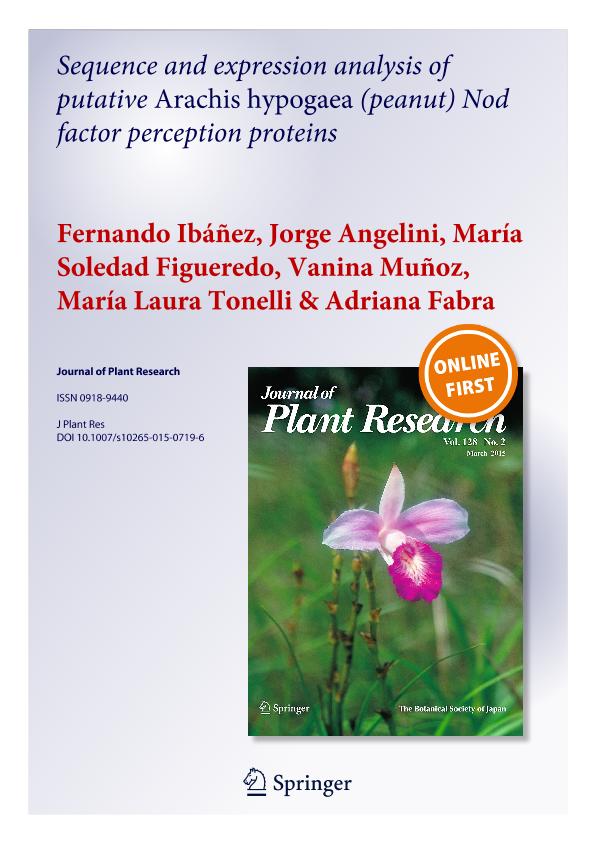Mostrar el registro sencillo del ítem
dc.contributor.author
Ibañez, Fernando Julio

dc.contributor.author
Angelini, Jorge Guillermo

dc.contributor.author
Figueredo, María Soledad

dc.contributor.author
Muñoz, Vanina Laura

dc.contributor.author
Tonelli, Maria Laura

dc.contributor.author
Fabra, Adriana Isidora

dc.date.available
2022-12-05T11:51:28Z
dc.date.issued
2015-03
dc.identifier.citation
Ibañez, Fernando Julio; Angelini, Jorge Guillermo; Figueredo, María Soledad; Muñoz, Vanina Laura; Tonelli, Maria Laura; et al.; Sequence and expression analysis of putative Arachis hypogaea (peanut) Nod factor perception proteins; Springer Tokyo; Journal of Plant Research; 128; 4; 3-2015; 709-718
dc.identifier.issn
0918-9440
dc.identifier.uri
http://hdl.handle.net/11336/180106
dc.description.abstract
Peanut, like most legumes, develops a symbiotic relationship with rhizobia to overcome nitrogen limitation. Rhizobial infection of peanut roots occurs through a primitive and poorly characterized intercellular mechanism. Knowledge of the molecular determinants of this symbiotic interaction is scarce, and little is known about the molecules implicated in the recognition of the symbionts. Here, we identify the LysM extracellular domain sequences of two putative peanut Nod factor receptors, named AhNFR1 and AhNFP. Phylogenetic analyses indicated that they correspond to LjNFR1 and LjNFR5 homologs, respectively. Transcriptional analysis revealed that, unlike LjNFR5, AhNFP expression was not induced at 8 h post bradyrhizobial inoculation. Further examination of AhNFP showed that the predicted protein sequence is identical to GmNFR5 in two positions that are crucial for Nod factor perception in other legumes. Analysis of the AhNFP LysM2 tridimensional model revealed that these two amino acids are very close, delimiting a zone of the molecule essential for Nod factor recognition. These data, together with the analysis of the molecular structure of Nod factors of native peanut symbionts previously reported, suggest that peanut and soybean could share some of the determinants involved in the signalling cascade that allows symbiosis establishment.
dc.format
application/pdf
dc.language.iso
eng
dc.publisher
Springer Tokyo

dc.rights
info:eu-repo/semantics/openAccess
dc.rights.uri
https://creativecommons.org/licenses/by-nc-sa/2.5/ar/
dc.subject
BRADYRHIZOBIA
dc.subject
MOLECULAR RECOGNITION
dc.subject
NOD FACTOR
dc.subject
NOD FACTOR RECEPTOR PROTEINS
dc.subject
PEANUT
dc.subject
SYMBIOSIS
dc.subject.classification
Agricultura

dc.subject.classification
Agricultura, Silvicultura y Pesca

dc.subject.classification
CIENCIAS AGRÍCOLAS

dc.title
Sequence and expression analysis of putative Arachis hypogaea (peanut) Nod factor perception proteins
dc.type
info:eu-repo/semantics/article
dc.type
info:ar-repo/semantics/artículo
dc.type
info:eu-repo/semantics/publishedVersion
dc.date.updated
2022-12-05T10:44:24Z
dc.journal.volume
128
dc.journal.number
4
dc.journal.pagination
709-718
dc.journal.pais
Japón

dc.journal.ciudad
Tokyo
dc.description.fil
Fil: Ibañez, Fernando Julio. Universidad Nacional de Río Cuarto. Facultad de Ciencias Exactas Fisicoquimicas y Naturales. Departamento de Ciencias Naturales. Cátedra de Biologia General; Argentina. Consejo Nacional de Investigaciones Científicas y Técnicas. Centro Científico Tecnológico Conicet - Córdoba; Argentina
dc.description.fil
Fil: Angelini, Jorge Guillermo. Consejo Nacional de Investigaciones Científicas y Técnicas. Centro Científico Tecnológico Conicet - Córdoba; Argentina. Universidad Nacional de Río Cuarto. Facultad de Ciencias Exactas Fisicoquimicas y Naturales. Departamento de Ciencias Naturales. Cátedra de Biologia General; Argentina
dc.description.fil
Fil: Figueredo, María Soledad. Consejo Nacional de Investigaciones Científicas y Técnicas. Centro Científico Tecnológico Conicet - Córdoba; Argentina. Universidad Nacional de Río Cuarto. Facultad de Ciencias Exactas Fisicoquimicas y Naturales. Departamento de Ciencias Naturales. Cátedra de Biologia General; Argentina
dc.description.fil
Fil: Muñoz, Vanina Laura. Universidad Nacional de Río Cuarto. Facultad de Ciencias Exactas Fisicoquimicas y Naturales. Departamento de Ciencias Naturales. Cátedra de Biologia General; Argentina. Consejo Nacional de Investigaciones Científicas y Técnicas. Centro Científico Tecnológico Conicet - Córdoba; Argentina
dc.description.fil
Fil: Tonelli, Maria Laura. Universidad Nacional de Río Cuarto. Facultad de Ciencias Exactas Fisicoquimicas y Naturales. Departamento de Ciencias Naturales. Cátedra de Biologia General; Argentina. Consejo Nacional de Investigaciones Científicas y Técnicas. Centro Científico Tecnológico Conicet - Córdoba; Argentina
dc.description.fil
Fil: Fabra, Adriana Isidora. Universidad Nacional de Río Cuarto. Facultad de Ciencias Exactas Fisicoquimicas y Naturales. Departamento de Ciencias Naturales. Cátedra de Biologia General; Argentina. Consejo Nacional de Investigaciones Científicas y Técnicas. Centro Científico Tecnológico Conicet - Córdoba; Argentina
dc.journal.title
Journal of Plant Research

dc.relation.alternativeid
info:eu-repo/semantics/altIdentifier/url/https://link.springer.com/article/10.1007/s10265-015-0719-6
dc.relation.alternativeid
info:eu-repo/semantics/altIdentifier/doi/http://dx.doi.org/10.1007/s10265-015-0719-6
Archivos asociados
